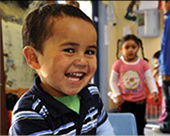Leadership Mentoring
MIT has prepared a range of professional development opportunities for Early Childhood Services in the Auckland South region which are funded by the Ministry of Education.
Aim of Leadership Mentoring:
The aim of leadership mentoring is to assist early childhood teachers and management to develop effective teaching and leadership practices based on Te Whariki and other relevant best evidence, to enable the best possible learning outcomes for children. In particular, the programme aims to develop, support and strengthen:
- Teaching, learning and leadership practices
- Effective teaching and leadership practices that are responsive to Maori and Pasifika learners and their families
- Curriculum and leadership that is responsive to the cultural and social context of the families the ECE service works with
The focus for this Leadership Mentoring Professional Development Programme is on targeting:
- Locations with low rates of ECE participation to support quality provision in those communities;
- Services that are likely to enrol children who have the greatest potential benefit to make from participating in quality early childhood education (Maori, Pasifika and children from low socio-economic areas).
This programme will include ECE leaders from the ECE services that MIT has been contracted to work with by the Ministry of Education in target locations. Leaders in early childhood services will be invited to apply to join the mentoring programme for up to one year starting in February 2011.
The Ministry of Education requires the funded professional development to be based on specific focus areas. This programme will have a strong focus on developing leadership skills based on the aspirations and needs of individual leaders. Valuing language, culture and identity is central to all of the programmes in order to maximise the potential of children.
Approach to Leadership Mentoring:
The aim is to implement a process of inquiry that will help solve current challenges as well as developing patterns for improving and strengthening leadership practices during and after the period in which the professional development is completed. This is essentially a self inquiry process which may have one or more cycles, depending on the professional development needs of the leader. A process of formative and summative evaluation and review will be included in order to determine the length of time each leader will need to be involved in the programme and to provide milestone evaluation points. This programme will commence in February 2011.
What ECE leaders can expect from MIT:
There will be between 5 - 7 ECE leaders included in the leadership mentoring programme across each of the regions MIT is working with in Auckland South during 2011. The regions MIT will provide leadership mentoring in are:- Manurewa
- Mangere
- Otara
- Papatoetoe
MIT will provide a professional development mentor to work with each ECE leader throughout the programme. The role of the mentor will be to assist the leader to determine the focus of the professional development, and to provide guidance and support through a process of self inquiry and development that is responsive and reflexive to the needs of the leader throughout the year.
The Programme will Consist of:
- One on one needs assessment to determine the focus of the leadership professional development and to develop agreed goals and expectations.
- In centre guidance and support meetings every 3 – 4 weeks for the duration of the programme.
- In centre observation, data gathering, modelling, one to one discussions and feedback with leaders as required.
- Membership to ECE leaders cluster group in each region. Bi - monthly meetings with other ECE leaders providing support and professional discourse.
What Commitment is Required from ECE Leaders:
It is expected that ECE leaders who participate in this programme will:
- Commit to participating in the mentoring professional development programme for at least one year
- The centre of employment will be responsible for ensuring the leaders are released from centre duties so they can meet with the MIT facilitator (this may be during the day sometimes) at least once every 3 – 4 weeks
- Commit to attending bi-monthly cluster group meetings with other leaders in the same region
- Have access to ICT equipment that will enable documentation and participation in the programme i.e. a digital camera, centre computer and internet access
- Maintain relevant documentation providing evidence of the mentoring and professional development process throughout the year.
How to become involved in this programme:
Applications for 2011 are open now. Download an application form here.Please complete and return your application to:
Jaidan Mason
ND Block
Manukau Institute of Technology
Private Bag 94006 Manukau 2241


